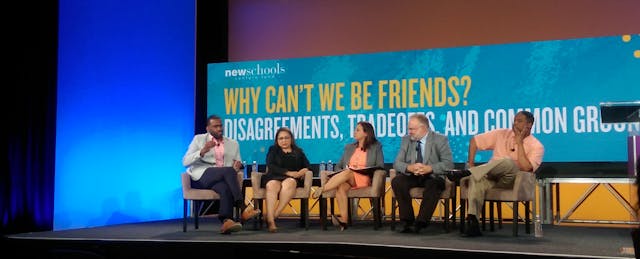Why can’t we be friends? That question wrapped up the closing session at the 2017 NewSchools Venture Fund Summit this week in Burlingame, Calif.
Now in its 18th year, the event rekindled an uncomfortable conversation that started last year, prodding the 1,200-plus registered attendees to consider the issues surrounding race and equity in education.
Last year’s gathering left a divisive aftertaste. A Chalkbeat reporter wrote that it “felt more like #BlackLivesMatter Rally.” The Fordham Institute, a conservative think tank, charged Summit organizers with trying to “push conservatives out of education reform.” The controversy engulfed many in the education reform community, some of whom signed an open letter.
So it was only a fitting follow-up that yesterday’s conference ended with a panel moderated by NewSchools CEO Stacey Childress, in an effort to “explore areas of disagreement and common ground, with an eye towards the coalition we need for the future.”
Joining her onstage were Shavar Jeffries (President of Democrats for Education Reform), Layla Avila (CEO of Education Leaders of Color), Matt Ladner (Senior Research Fellow at the Charles Koch Institute) and Gerard Robinson (resident fellow at the American Enterprise Institute).
Robinson, a Republican, started with a forthright answer to Childress’ friends question: “We’re not friends, we’re comrades. We’re comrades as long as we have a common enemy,” which he described as the system that prevents children from getting a high quality education. “We don’t have to be friends.”
Jeffries concurred. “If we disagree and can’t find common ground, then we got to fight. That’s okay. And if we have to fight where we have disagreements with our core values, we can do that respectfully.”
The schisms within the education reform movement, noted Avila, surfaced long before the last presidential election, evidenced by such problems as police violence. “For those of us working in the tent with our allies, we would have liked to see more people stand up and show up for us—which we didn’t see.”
“The same thing is happening with increased mass deportation,” she added. “Folks of color are looking around to see, ‘Who are the folks who are really with me?’”
There was no consensus on whether the education reform community should also tackle institutional racism, poverty, hunger and other critical children development issues. Robinson argued that focusing on improving teaching and learning in schools already requires more than enough work—and should remain the priority. “I don’t want to have to boil the ocean to cook an egg,” he said. Avila countered that divorcing educational issues from basic human needs suffers from “a lack of imagination.” Jeffries underscored Avila’s point: “If you really care about education, you have to care about the baby being hungry.”
The panel conversation was interspersed with video clips of leading education reformers offering their two-cents on provocative questions, including: Is race the most important educational issue today? Among the chorus who said “no” in the clip were Jeanne Allen (CEO of the Center of Education Reform) and Rick Hess (Director of Education Policy Studies at American Enterprise Institute).
On the other hand, even debating whether race is an issue in education struck Jeffries as almost absurd. He offered to “come with more facts, figures and Powerpoints to make people believe” that race matters as a lived experience in the reality of children. “We don’t have time to debate things that are demonstrably true,” he added.
Robinson challenged the reform community to expand its thinking of diversity to include “Asians [and] even rural white kids [who] hardly ever enter into the conversation.” Yet adding more diverse voices may surface even more areas of disagreements. “Some of the consternation with the big tent,’” he said, alluding to the education reform community, “isn’t because it got bigger. It’s because it got blacker and browner.”
The one question that drew a more muted response concerned the role of the federal department of education. Childress professed she has a “slightly libertarian streak” and “struggles with the idea of the federal government, from far away, setting priorities and driving action at the state and local level.”
Ladner from the Charles Koch Institute believes the federal department will play a smaller role, driven less by conflicting political ideologies and more of financial necessity. In five years, an aging population and rising Medicaid costs, he noted, will force the federal government to have to choose between funding healthcare or education. “I predict there will be a reduced role for the federal department of education,” he asserted.
Perhaps the sharpest disagreement emerged over the issue of vouchers, which Avila described as “a distraction that can fracture the movement” by distracting attention and resources away from deeper-rooted social and educational problems. That drew a rebuke from Robinson, who argued that the 400,000 families on the voucher programs may see her comment as “a slap in the face.”
That was perhaps the punchiest back-and-forth during the session. The panelists closed in agreement with the civility of the conversation. “We’re going to disagree,” said Jeffries. “It’s all good...It doesn’t have to be so dramatic with this ‘can we be friends’ stuff.”
Robinson left this tip for those heading to the post-conference social mixer: “Find somebody in this room who’s got gray hair and have conversations with them...Young people think they invented the future, but most of [those here in the room] were doing this work before you were born.”


